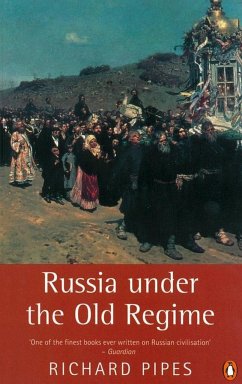Richard Pipes
Russia Under the Old Regime: Second Edition
16,99 €
inkl. MwSt.
Versandfertig in 2-4 Wochen

8 °P sammeln
Richard Pipes
Russia Under the Old Regime: Second Edition
- Broschiertes Buch
- Merkliste
- Auf die Merkliste
- Bewerten Bewerten
- Teilen
- Produkt teilen
- Produkterinnerung
- Produkterinnerung
Analyzes the evolution of the Russian state from the 9th century to the 1880s. It describes the "patrimonial" state, and analyzes the failure of the peasantry, nobility, middle-class and clergy to stand up to the increasing absolutism of the tsar.
Andere Kunden interessierten sich auch für
![Russians Among Us Russians Among Us]() Gordon CoreraRussians Among Us23,99 €
Gordon CoreraRussians Among Us23,99 €![Russians Among Us Russians Among Us]() Gordon CoreraRussians Among Us13,99 €
Gordon CoreraRussians Among Us13,99 €![Bone Music Bone Music]() Stephen CoatesBone Music24,99 €
Stephen CoatesBone Music24,99 €![Iron Curtain Iron Curtain]() Anne ApplebaumIron Curtain12,99 €
Anne ApplebaumIron Curtain12,99 €![The Future Is History The Future Is History]() Masha GessenThe Future Is History10,99 €
Masha GessenThe Future Is History10,99 €![A People's Tragedy A People's Tragedy]() Orlando FigesA People's Tragedy29,99 €
Orlando FigesA People's Tragedy29,99 €![Our Enemies Will Vanish Our Enemies Will Vanish]() Yaroslav TrofimovOur Enemies Will Vanish29,99 €
Yaroslav TrofimovOur Enemies Will Vanish29,99 €-
-
-
Analyzes the evolution of the Russian state from the 9th century to the 1880s. It describes the "patrimonial" state, and analyzes the failure of the peasantry, nobility, middle-class and clergy to stand up to the increasing absolutism of the tsar.
Hinweis: Dieser Artikel kann nur an eine deutsche Lieferadresse ausgeliefert werden.
Hinweis: Dieser Artikel kann nur an eine deutsche Lieferadresse ausgeliefert werden.
Produktdetails
- Produktdetails
- Verlag: Penguin Books Ltd
- Second Edition
- Seitenzahl: 384
- Altersempfehlung: ab 18 Jahre
- Erscheinungstermin: 1. Januar 1997
- Englisch
- Abmessung: 202mm x 132mm x 24mm
- Gewicht: 288g
- ISBN-13: 9780140247688
- ISBN-10: 0140247688
- Artikelnr.: 22184762
- Herstellerkennzeichnung
- Libri GmbH
- Europaallee 1
- 36244 Bad Hersfeld
- 06621 890
- Verlag: Penguin Books Ltd
- Second Edition
- Seitenzahl: 384
- Altersempfehlung: ab 18 Jahre
- Erscheinungstermin: 1. Januar 1997
- Englisch
- Abmessung: 202mm x 132mm x 24mm
- Gewicht: 288g
- ISBN-13: 9780140247688
- ISBN-10: 0140247688
- Artikelnr.: 22184762
- Herstellerkennzeichnung
- Libri GmbH
- Europaallee 1
- 36244 Bad Hersfeld
- 06621 890
Richard Pipes is a historian of Russia, and since 1990, has been Baird Emeritus Professor of History at Harvard University. His other books include The Russian Revolution and Russia under the Bolshevik Regime.
Foreword to the Second Edition
Foreword
Chapter 1: The Environment and its Consequences
1. The geographic setting: vegetation, soils, climate, precipitation and
waterways
2. The influence of Russia's northern location on her economy:
A. Short farming season
B. Poor yields
C. Lack of markets
D. Unprofitability of farming
E. Industrial side-occupations (promysly)
3. Influence on population movement
4. Influence on social organization:
A. Joint family
B. Peasant commune (obshchina)
5. Influence on political organization:
A. Incompatibility of means and ends
B. The 'patrimonial' system as solution
Part I: The State
Chapter 2: The Genesis of the Patrimonial State in Russia
1. Slav colonization of Russian territory
2. The Norman (Kievan) state:
A. The commercial nature of the state
B. Succession pattern
C. Assimilation of Normans
D. Origins of the name Rus'-Rossiia
E. The Norman legacy
3. The dissolution of the Kievan state:
A. Centrifugal forces
B. North west: Novgorod
C. Lithuania and Poland
4. The appanage (patrimonial) principality of the north-east:
A. The colonization of the Volga-Oka region
B. New political attitudes
C. The appanage principality as property
D. The prince's domain
E. The princely administration within and without
F. Boyars and boyar land
G. 'Black land'
5. The problem of feudalism in appanage Russia:
A. Political decentralization
B. Vassalage
C. Conditional land tenure
D. The political consequences of the absence in Russia of feudal tradition
6. Mongol conquest and domination:
A. The invasion
B. Character of rule and its influence on Russian politics
Chapter 3: The Triumph of Patrimonialism
1. The rise of Moscow:
A. 'Monocracy' and 'Autocracy'
B. The Great Principality of Vladimir and the Nevsky clan
C. Ivan I Kalita
D. Succession by primogeniture
2. The patrimonial principality:
A. Confusion of dominium and imperium
B. Domainial origin of Russia's administration
C. Failure to distinguish crown and state properties
3. The politicization of Moscow's patrimonial rulers:
A. Dissolution of the Golden Horde and collapse of Byzantium
B. The Mongol-Tatar sources of the Russian idea of kingship
C. Gosudar as sovereign
4. The expansion of Moscow:
A. Its psychological effects
B. The conquest of Novgorod by Ivan III
C. Subsequent acquisitions
Chapter 4: The Anatomy of the Patrimonial Regime
1. Servitors and commoners
2. The service estate:
A. Boyars lose right of free departure
B. Mestnichestvo as last boyar weapon
C. The rise of dvoriane
D. The oprichnina
E. Terms and forms of service
3. Commoners:
A. Tiaglo
B. Serfdom: its rise and spread
4. The administration: Duma, Sobor, bureaucracy
5. Mechanism of control and repression:
A. Denunciation as civic duty
B. Closed frontiers
Chapter 5: The Partial Dismantling of the Patrimonial State
1. The crisis of the patrimonial system
2. The Military reforms of Peter I:
A. Shortcomings of the old army
B. Creation of a standing army
C. Effect on commoners: soul tax and conscription
D. Effect on servitors: compulsory schooling and Table of Ranks
3. Construction of St. Petersburg
4. The idea of 'public good' and its implications
5. Creation of a political police under Peter I
6. Dvoriane emancipate themselves from service
7. The bureaucracy slips out of the crown's control
8. The dyarchic constitution of post-1762 Russia
Part II: Society
Chapter 6: The Peasantry
1. The routine of peasant life
2. Social stratification:
A. Proprietary peasants and state peasants
B. Peasants on quit rent and corvée
3. The condition of Russian serfs
4. The effect of serfdom on the peasant psyche
5. Some traits of the peasant mentality
6. The political outlook of the muzhik
7. The Emancipation settlement of 1861:
A. Causes of emancipation
B. Provisions of Edict of 19 February 1861
C. Shortcomings of the settlement
8. The agrarian crisis at the turn of the century
Chapter 7: Dvorianstvo
1. Dispersal and rapid turnover of landed wealth in Russia
2. Impoverishment of dvoriane:
A. Poverty of the rank and file and absence of primogeniture as its major
cause
B. Statistics of serf distribution
3. Serfdom as cause of dvorianstvo dependence on the crown
4. Absence of corporate institutions and spirit
5. Political ineffectiveness of this class
6. Political attitudes:
A. Grandees
B. The middle group ('gentry')
7. Catastrophic decline of dvoriane after 1861
Chapter 8: The Missing Bourgeoisie
1. The aptitude of Russians for trade and industry
2. The Muscovite monarchy monopolizes industry and trade:
A. Regalia
B. Domestic merchants (gosti) and foreigners as servants of the crown
3. Russian urban institutions:
A. The city of the western type
B. Muscovite cities as microcosm of Russian society
4. The Muscovite merchant class:
A. Levantine characteristics
B. Pre-captialist economy
5. Change in the government's attitude towards merchants in the late
seventeenth and eighteenth century: Peter's policies
6. The policies of Catherine II:
A. Freeing of trade and manufacture from restrictions
B. Effect of these measures on dvoriane
C. Emergence of serf-entrepreneurs
7. New policy towards the cities
8. The merchant of imperial Russia
9. Economic and political inertia of Russian merchants
Chapter 9: The Church as Servant of the State
1. The aesthetic and spiritual aspects of Orthodoxy
2. Orthodoxy and state: symphonia as the ideal
3. The Golden Age of the Russian Church (thirteenth-fifteenth centuries):
A. Growth of monasticism
B. Effect on clergy
C. Controversy over monastic landholding
4. The church works out the autocratic and imperial ideology for Moscow's
rulers
5. The Schism:
A. Its origins and political aspects
B. The dissenters: Old Believers and Sectarians
6. The subordination of church to state in the eighteenth century:
A. Peter's measures
B. Secularization of church land under Catherine II
7. Growing isolation of church and clergy
Part III: Intelligentsia Versus the State
Chapter 10: The Intelligentsia
1. Inability of 'interest groups' to restrain Russian autocracy
2. The 'intelligentsia': origins and meaning of the term
3. Emergence of public opinion under Catherine II:
A. Antecedents
B. Catherine's own contribution
C. Novikov
D. Radishchev
E. The Decembrists
4. The generation of Idealists:
A. Impact of German Idealism on Russia
B. Psychological consequences
5. Social and institutional characteristics of the intelligentsia:
A. Influx of commoners after 1855
B. Salon, university, circle, journals, and zemstva
6. The Slavophile-Westerner controversy:
A. Chaadaev opens the debate
B. Slavophile theory
C. The 'Westerners'
7. Crystallization of opinion in the 1860s
8. The new radicalism:
A. Its western sources
B. 'Nihilism'
C. The historic function of the intelligentsia as seen by itself
D. Socialist-revolutionary tactics, 1860-80
E. Perplexed reaction of the liberal camp
9. Conservatism:
A. Conservative analysis of 'nihilism'
B. Need to rediscover lost roots
C. Political attitudes
10. The conflict between radicals, intellectuals, and writers:
A. Utilitarian aesthetics
B. Pushkin as an object of contention
C. The writers fight back
D. Long term implications of this conflict
Chapter 11: Towards the Police State
1. The bureaucracy in Russia:
A. Relative understaffing
B. Corruption as inherent in the Russia system of administration
C. Underpayment
D. Hierarchical distinctions
E. Gulf between central and provincial officialdom
2. Late and weak development of legality
3. Evolution of anti-subversive statutes:
A. Absence of adequate measures before 1825
B. Creation of regular political police (Third Section)
C. Censorship Code of 1826
D. Crimes against state defined and punishments provided for them
E. Efforts to improve justice for political offenders after 1864 frustrated
by the intelligentsia
4. Initial government reactions to revolutionary terror:
A. The radicals go over to terror
B. Government over-reacts and lays bases for police state in Russia
C. Security measures, 1878-80
D. Creation of the Department of Police State (1880)
E. Its uniqueness
5. Failure of efforts at political reform
6. The 'Temporary' Law of 14 August 1881
7. Police interference in everyday Russian life
8. Exile and hard labour
9. Summary of police institutions in Russia of the early 1880s
10. Zubatov and portents of totalitarianism
11. Imperial Russia not an effective police state:
A. Private property
B. Foreign travel
C. Cultural inhibitions
12. Police powers undermine the old regime
13. Concluding remarks
Notes
Chronology
Index
Foreword
Chapter 1: The Environment and its Consequences
1. The geographic setting: vegetation, soils, climate, precipitation and
waterways
2. The influence of Russia's northern location on her economy:
A. Short farming season
B. Poor yields
C. Lack of markets
D. Unprofitability of farming
E. Industrial side-occupations (promysly)
3. Influence on population movement
4. Influence on social organization:
A. Joint family
B. Peasant commune (obshchina)
5. Influence on political organization:
A. Incompatibility of means and ends
B. The 'patrimonial' system as solution
Part I: The State
Chapter 2: The Genesis of the Patrimonial State in Russia
1. Slav colonization of Russian territory
2. The Norman (Kievan) state:
A. The commercial nature of the state
B. Succession pattern
C. Assimilation of Normans
D. Origins of the name Rus'-Rossiia
E. The Norman legacy
3. The dissolution of the Kievan state:
A. Centrifugal forces
B. North west: Novgorod
C. Lithuania and Poland
4. The appanage (patrimonial) principality of the north-east:
A. The colonization of the Volga-Oka region
B. New political attitudes
C. The appanage principality as property
D. The prince's domain
E. The princely administration within and without
F. Boyars and boyar land
G. 'Black land'
5. The problem of feudalism in appanage Russia:
A. Political decentralization
B. Vassalage
C. Conditional land tenure
D. The political consequences of the absence in Russia of feudal tradition
6. Mongol conquest and domination:
A. The invasion
B. Character of rule and its influence on Russian politics
Chapter 3: The Triumph of Patrimonialism
1. The rise of Moscow:
A. 'Monocracy' and 'Autocracy'
B. The Great Principality of Vladimir and the Nevsky clan
C. Ivan I Kalita
D. Succession by primogeniture
2. The patrimonial principality:
A. Confusion of dominium and imperium
B. Domainial origin of Russia's administration
C. Failure to distinguish crown and state properties
3. The politicization of Moscow's patrimonial rulers:
A. Dissolution of the Golden Horde and collapse of Byzantium
B. The Mongol-Tatar sources of the Russian idea of kingship
C. Gosudar as sovereign
4. The expansion of Moscow:
A. Its psychological effects
B. The conquest of Novgorod by Ivan III
C. Subsequent acquisitions
Chapter 4: The Anatomy of the Patrimonial Regime
1. Servitors and commoners
2. The service estate:
A. Boyars lose right of free departure
B. Mestnichestvo as last boyar weapon
C. The rise of dvoriane
D. The oprichnina
E. Terms and forms of service
3. Commoners:
A. Tiaglo
B. Serfdom: its rise and spread
4. The administration: Duma, Sobor, bureaucracy
5. Mechanism of control and repression:
A. Denunciation as civic duty
B. Closed frontiers
Chapter 5: The Partial Dismantling of the Patrimonial State
1. The crisis of the patrimonial system
2. The Military reforms of Peter I:
A. Shortcomings of the old army
B. Creation of a standing army
C. Effect on commoners: soul tax and conscription
D. Effect on servitors: compulsory schooling and Table of Ranks
3. Construction of St. Petersburg
4. The idea of 'public good' and its implications
5. Creation of a political police under Peter I
6. Dvoriane emancipate themselves from service
7. The bureaucracy slips out of the crown's control
8. The dyarchic constitution of post-1762 Russia
Part II: Society
Chapter 6: The Peasantry
1. The routine of peasant life
2. Social stratification:
A. Proprietary peasants and state peasants
B. Peasants on quit rent and corvée
3. The condition of Russian serfs
4. The effect of serfdom on the peasant psyche
5. Some traits of the peasant mentality
6. The political outlook of the muzhik
7. The Emancipation settlement of 1861:
A. Causes of emancipation
B. Provisions of Edict of 19 February 1861
C. Shortcomings of the settlement
8. The agrarian crisis at the turn of the century
Chapter 7: Dvorianstvo
1. Dispersal and rapid turnover of landed wealth in Russia
2. Impoverishment of dvoriane:
A. Poverty of the rank and file and absence of primogeniture as its major
cause
B. Statistics of serf distribution
3. Serfdom as cause of dvorianstvo dependence on the crown
4. Absence of corporate institutions and spirit
5. Political ineffectiveness of this class
6. Political attitudes:
A. Grandees
B. The middle group ('gentry')
7. Catastrophic decline of dvoriane after 1861
Chapter 8: The Missing Bourgeoisie
1. The aptitude of Russians for trade and industry
2. The Muscovite monarchy monopolizes industry and trade:
A. Regalia
B. Domestic merchants (gosti) and foreigners as servants of the crown
3. Russian urban institutions:
A. The city of the western type
B. Muscovite cities as microcosm of Russian society
4. The Muscovite merchant class:
A. Levantine characteristics
B. Pre-captialist economy
5. Change in the government's attitude towards merchants in the late
seventeenth and eighteenth century: Peter's policies
6. The policies of Catherine II:
A. Freeing of trade and manufacture from restrictions
B. Effect of these measures on dvoriane
C. Emergence of serf-entrepreneurs
7. New policy towards the cities
8. The merchant of imperial Russia
9. Economic and political inertia of Russian merchants
Chapter 9: The Church as Servant of the State
1. The aesthetic and spiritual aspects of Orthodoxy
2. Orthodoxy and state: symphonia as the ideal
3. The Golden Age of the Russian Church (thirteenth-fifteenth centuries):
A. Growth of monasticism
B. Effect on clergy
C. Controversy over monastic landholding
4. The church works out the autocratic and imperial ideology for Moscow's
rulers
5. The Schism:
A. Its origins and political aspects
B. The dissenters: Old Believers and Sectarians
6. The subordination of church to state in the eighteenth century:
A. Peter's measures
B. Secularization of church land under Catherine II
7. Growing isolation of church and clergy
Part III: Intelligentsia Versus the State
Chapter 10: The Intelligentsia
1. Inability of 'interest groups' to restrain Russian autocracy
2. The 'intelligentsia': origins and meaning of the term
3. Emergence of public opinion under Catherine II:
A. Antecedents
B. Catherine's own contribution
C. Novikov
D. Radishchev
E. The Decembrists
4. The generation of Idealists:
A. Impact of German Idealism on Russia
B. Psychological consequences
5. Social and institutional characteristics of the intelligentsia:
A. Influx of commoners after 1855
B. Salon, university, circle, journals, and zemstva
6. The Slavophile-Westerner controversy:
A. Chaadaev opens the debate
B. Slavophile theory
C. The 'Westerners'
7. Crystallization of opinion in the 1860s
8. The new radicalism:
A. Its western sources
B. 'Nihilism'
C. The historic function of the intelligentsia as seen by itself
D. Socialist-revolutionary tactics, 1860-80
E. Perplexed reaction of the liberal camp
9. Conservatism:
A. Conservative analysis of 'nihilism'
B. Need to rediscover lost roots
C. Political attitudes
10. The conflict between radicals, intellectuals, and writers:
A. Utilitarian aesthetics
B. Pushkin as an object of contention
C. The writers fight back
D. Long term implications of this conflict
Chapter 11: Towards the Police State
1. The bureaucracy in Russia:
A. Relative understaffing
B. Corruption as inherent in the Russia system of administration
C. Underpayment
D. Hierarchical distinctions
E. Gulf between central and provincial officialdom
2. Late and weak development of legality
3. Evolution of anti-subversive statutes:
A. Absence of adequate measures before 1825
B. Creation of regular political police (Third Section)
C. Censorship Code of 1826
D. Crimes against state defined and punishments provided for them
E. Efforts to improve justice for political offenders after 1864 frustrated
by the intelligentsia
4. Initial government reactions to revolutionary terror:
A. The radicals go over to terror
B. Government over-reacts and lays bases for police state in Russia
C. Security measures, 1878-80
D. Creation of the Department of Police State (1880)
E. Its uniqueness
5. Failure of efforts at political reform
6. The 'Temporary' Law of 14 August 1881
7. Police interference in everyday Russian life
8. Exile and hard labour
9. Summary of police institutions in Russia of the early 1880s
10. Zubatov and portents of totalitarianism
11. Imperial Russia not an effective police state:
A. Private property
B. Foreign travel
C. Cultural inhibitions
12. Police powers undermine the old regime
13. Concluding remarks
Notes
Chronology
Index
Foreword to the Second Edition
Foreword
Chapter 1: The Environment and its Consequences
1. The geographic setting: vegetation, soils, climate, precipitation and
waterways
2. The influence of Russia's northern location on her economy:
A. Short farming season
B. Poor yields
C. Lack of markets
D. Unprofitability of farming
E. Industrial side-occupations (promysly)
3. Influence on population movement
4. Influence on social organization:
A. Joint family
B. Peasant commune (obshchina)
5. Influence on political organization:
A. Incompatibility of means and ends
B. The 'patrimonial' system as solution
Part I: The State
Chapter 2: The Genesis of the Patrimonial State in Russia
1. Slav colonization of Russian territory
2. The Norman (Kievan) state:
A. The commercial nature of the state
B. Succession pattern
C. Assimilation of Normans
D. Origins of the name Rus'-Rossiia
E. The Norman legacy
3. The dissolution of the Kievan state:
A. Centrifugal forces
B. North west: Novgorod
C. Lithuania and Poland
4. The appanage (patrimonial) principality of the north-east:
A. The colonization of the Volga-Oka region
B. New political attitudes
C. The appanage principality as property
D. The prince's domain
E. The princely administration within and without
F. Boyars and boyar land
G. 'Black land'
5. The problem of feudalism in appanage Russia:
A. Political decentralization
B. Vassalage
C. Conditional land tenure
D. The political consequences of the absence in Russia of feudal tradition
6. Mongol conquest and domination:
A. The invasion
B. Character of rule and its influence on Russian politics
Chapter 3: The Triumph of Patrimonialism
1. The rise of Moscow:
A. 'Monocracy' and 'Autocracy'
B. The Great Principality of Vladimir and the Nevsky clan
C. Ivan I Kalita
D. Succession by primogeniture
2. The patrimonial principality:
A. Confusion of dominium and imperium
B. Domainial origin of Russia's administration
C. Failure to distinguish crown and state properties
3. The politicization of Moscow's patrimonial rulers:
A. Dissolution of the Golden Horde and collapse of Byzantium
B. The Mongol-Tatar sources of the Russian idea of kingship
C. Gosudar as sovereign
4. The expansion of Moscow:
A. Its psychological effects
B. The conquest of Novgorod by Ivan III
C. Subsequent acquisitions
Chapter 4: The Anatomy of the Patrimonial Regime
1. Servitors and commoners
2. The service estate:
A. Boyars lose right of free departure
B. Mestnichestvo as last boyar weapon
C. The rise of dvoriane
D. The oprichnina
E. Terms and forms of service
3. Commoners:
A. Tiaglo
B. Serfdom: its rise and spread
4. The administration: Duma, Sobor, bureaucracy
5. Mechanism of control and repression:
A. Denunciation as civic duty
B. Closed frontiers
Chapter 5: The Partial Dismantling of the Patrimonial State
1. The crisis of the patrimonial system
2. The Military reforms of Peter I:
A. Shortcomings of the old army
B. Creation of a standing army
C. Effect on commoners: soul tax and conscription
D. Effect on servitors: compulsory schooling and Table of Ranks
3. Construction of St. Petersburg
4. The idea of 'public good' and its implications
5. Creation of a political police under Peter I
6. Dvoriane emancipate themselves from service
7. The bureaucracy slips out of the crown's control
8. The dyarchic constitution of post-1762 Russia
Part II: Society
Chapter 6: The Peasantry
1. The routine of peasant life
2. Social stratification:
A. Proprietary peasants and state peasants
B. Peasants on quit rent and corvée
3. The condition of Russian serfs
4. The effect of serfdom on the peasant psyche
5. Some traits of the peasant mentality
6. The political outlook of the muzhik
7. The Emancipation settlement of 1861:
A. Causes of emancipation
B. Provisions of Edict of 19 February 1861
C. Shortcomings of the settlement
8. The agrarian crisis at the turn of the century
Chapter 7: Dvorianstvo
1. Dispersal and rapid turnover of landed wealth in Russia
2. Impoverishment of dvoriane:
A. Poverty of the rank and file and absence of primogeniture as its major
cause
B. Statistics of serf distribution
3. Serfdom as cause of dvorianstvo dependence on the crown
4. Absence of corporate institutions and spirit
5. Political ineffectiveness of this class
6. Political attitudes:
A. Grandees
B. The middle group ('gentry')
7. Catastrophic decline of dvoriane after 1861
Chapter 8: The Missing Bourgeoisie
1. The aptitude of Russians for trade and industry
2. The Muscovite monarchy monopolizes industry and trade:
A. Regalia
B. Domestic merchants (gosti) and foreigners as servants of the crown
3. Russian urban institutions:
A. The city of the western type
B. Muscovite cities as microcosm of Russian society
4. The Muscovite merchant class:
A. Levantine characteristics
B. Pre-captialist economy
5. Change in the government's attitude towards merchants in the late
seventeenth and eighteenth century: Peter's policies
6. The policies of Catherine II:
A. Freeing of trade and manufacture from restrictions
B. Effect of these measures on dvoriane
C. Emergence of serf-entrepreneurs
7. New policy towards the cities
8. The merchant of imperial Russia
9. Economic and political inertia of Russian merchants
Chapter 9: The Church as Servant of the State
1. The aesthetic and spiritual aspects of Orthodoxy
2. Orthodoxy and state: symphonia as the ideal
3. The Golden Age of the Russian Church (thirteenth-fifteenth centuries):
A. Growth of monasticism
B. Effect on clergy
C. Controversy over monastic landholding
4. The church works out the autocratic and imperial ideology for Moscow's
rulers
5. The Schism:
A. Its origins and political aspects
B. The dissenters: Old Believers and Sectarians
6. The subordination of church to state in the eighteenth century:
A. Peter's measures
B. Secularization of church land under Catherine II
7. Growing isolation of church and clergy
Part III: Intelligentsia Versus the State
Chapter 10: The Intelligentsia
1. Inability of 'interest groups' to restrain Russian autocracy
2. The 'intelligentsia': origins and meaning of the term
3. Emergence of public opinion under Catherine II:
A. Antecedents
B. Catherine's own contribution
C. Novikov
D. Radishchev
E. The Decembrists
4. The generation of Idealists:
A. Impact of German Idealism on Russia
B. Psychological consequences
5. Social and institutional characteristics of the intelligentsia:
A. Influx of commoners after 1855
B. Salon, university, circle, journals, and zemstva
6. The Slavophile-Westerner controversy:
A. Chaadaev opens the debate
B. Slavophile theory
C. The 'Westerners'
7. Crystallization of opinion in the 1860s
8. The new radicalism:
A. Its western sources
B. 'Nihilism'
C. The historic function of the intelligentsia as seen by itself
D. Socialist-revolutionary tactics, 1860-80
E. Perplexed reaction of the liberal camp
9. Conservatism:
A. Conservative analysis of 'nihilism'
B. Need to rediscover lost roots
C. Political attitudes
10. The conflict between radicals, intellectuals, and writers:
A. Utilitarian aesthetics
B. Pushkin as an object of contention
C. The writers fight back
D. Long term implications of this conflict
Chapter 11: Towards the Police State
1. The bureaucracy in Russia:
A. Relative understaffing
B. Corruption as inherent in the Russia system of administration
C. Underpayment
D. Hierarchical distinctions
E. Gulf between central and provincial officialdom
2. Late and weak development of legality
3. Evolution of anti-subversive statutes:
A. Absence of adequate measures before 1825
B. Creation of regular political police (Third Section)
C. Censorship Code of 1826
D. Crimes against state defined and punishments provided for them
E. Efforts to improve justice for political offenders after 1864 frustrated
by the intelligentsia
4. Initial government reactions to revolutionary terror:
A. The radicals go over to terror
B. Government over-reacts and lays bases for police state in Russia
C. Security measures, 1878-80
D. Creation of the Department of Police State (1880)
E. Its uniqueness
5. Failure of efforts at political reform
6. The 'Temporary' Law of 14 August 1881
7. Police interference in everyday Russian life
8. Exile and hard labour
9. Summary of police institutions in Russia of the early 1880s
10. Zubatov and portents of totalitarianism
11. Imperial Russia not an effective police state:
A. Private property
B. Foreign travel
C. Cultural inhibitions
12. Police powers undermine the old regime
13. Concluding remarks
Notes
Chronology
Index
Foreword
Chapter 1: The Environment and its Consequences
1. The geographic setting: vegetation, soils, climate, precipitation and
waterways
2. The influence of Russia's northern location on her economy:
A. Short farming season
B. Poor yields
C. Lack of markets
D. Unprofitability of farming
E. Industrial side-occupations (promysly)
3. Influence on population movement
4. Influence on social organization:
A. Joint family
B. Peasant commune (obshchina)
5. Influence on political organization:
A. Incompatibility of means and ends
B. The 'patrimonial' system as solution
Part I: The State
Chapter 2: The Genesis of the Patrimonial State in Russia
1. Slav colonization of Russian territory
2. The Norman (Kievan) state:
A. The commercial nature of the state
B. Succession pattern
C. Assimilation of Normans
D. Origins of the name Rus'-Rossiia
E. The Norman legacy
3. The dissolution of the Kievan state:
A. Centrifugal forces
B. North west: Novgorod
C. Lithuania and Poland
4. The appanage (patrimonial) principality of the north-east:
A. The colonization of the Volga-Oka region
B. New political attitudes
C. The appanage principality as property
D. The prince's domain
E. The princely administration within and without
F. Boyars and boyar land
G. 'Black land'
5. The problem of feudalism in appanage Russia:
A. Political decentralization
B. Vassalage
C. Conditional land tenure
D. The political consequences of the absence in Russia of feudal tradition
6. Mongol conquest and domination:
A. The invasion
B. Character of rule and its influence on Russian politics
Chapter 3: The Triumph of Patrimonialism
1. The rise of Moscow:
A. 'Monocracy' and 'Autocracy'
B. The Great Principality of Vladimir and the Nevsky clan
C. Ivan I Kalita
D. Succession by primogeniture
2. The patrimonial principality:
A. Confusion of dominium and imperium
B. Domainial origin of Russia's administration
C. Failure to distinguish crown and state properties
3. The politicization of Moscow's patrimonial rulers:
A. Dissolution of the Golden Horde and collapse of Byzantium
B. The Mongol-Tatar sources of the Russian idea of kingship
C. Gosudar as sovereign
4. The expansion of Moscow:
A. Its psychological effects
B. The conquest of Novgorod by Ivan III
C. Subsequent acquisitions
Chapter 4: The Anatomy of the Patrimonial Regime
1. Servitors and commoners
2. The service estate:
A. Boyars lose right of free departure
B. Mestnichestvo as last boyar weapon
C. The rise of dvoriane
D. The oprichnina
E. Terms and forms of service
3. Commoners:
A. Tiaglo
B. Serfdom: its rise and spread
4. The administration: Duma, Sobor, bureaucracy
5. Mechanism of control and repression:
A. Denunciation as civic duty
B. Closed frontiers
Chapter 5: The Partial Dismantling of the Patrimonial State
1. The crisis of the patrimonial system
2. The Military reforms of Peter I:
A. Shortcomings of the old army
B. Creation of a standing army
C. Effect on commoners: soul tax and conscription
D. Effect on servitors: compulsory schooling and Table of Ranks
3. Construction of St. Petersburg
4. The idea of 'public good' and its implications
5. Creation of a political police under Peter I
6. Dvoriane emancipate themselves from service
7. The bureaucracy slips out of the crown's control
8. The dyarchic constitution of post-1762 Russia
Part II: Society
Chapter 6: The Peasantry
1. The routine of peasant life
2. Social stratification:
A. Proprietary peasants and state peasants
B. Peasants on quit rent and corvée
3. The condition of Russian serfs
4. The effect of serfdom on the peasant psyche
5. Some traits of the peasant mentality
6. The political outlook of the muzhik
7. The Emancipation settlement of 1861:
A. Causes of emancipation
B. Provisions of Edict of 19 February 1861
C. Shortcomings of the settlement
8. The agrarian crisis at the turn of the century
Chapter 7: Dvorianstvo
1. Dispersal and rapid turnover of landed wealth in Russia
2. Impoverishment of dvoriane:
A. Poverty of the rank and file and absence of primogeniture as its major
cause
B. Statistics of serf distribution
3. Serfdom as cause of dvorianstvo dependence on the crown
4. Absence of corporate institutions and spirit
5. Political ineffectiveness of this class
6. Political attitudes:
A. Grandees
B. The middle group ('gentry')
7. Catastrophic decline of dvoriane after 1861
Chapter 8: The Missing Bourgeoisie
1. The aptitude of Russians for trade and industry
2. The Muscovite monarchy monopolizes industry and trade:
A. Regalia
B. Domestic merchants (gosti) and foreigners as servants of the crown
3. Russian urban institutions:
A. The city of the western type
B. Muscovite cities as microcosm of Russian society
4. The Muscovite merchant class:
A. Levantine characteristics
B. Pre-captialist economy
5. Change in the government's attitude towards merchants in the late
seventeenth and eighteenth century: Peter's policies
6. The policies of Catherine II:
A. Freeing of trade and manufacture from restrictions
B. Effect of these measures on dvoriane
C. Emergence of serf-entrepreneurs
7. New policy towards the cities
8. The merchant of imperial Russia
9. Economic and political inertia of Russian merchants
Chapter 9: The Church as Servant of the State
1. The aesthetic and spiritual aspects of Orthodoxy
2. Orthodoxy and state: symphonia as the ideal
3. The Golden Age of the Russian Church (thirteenth-fifteenth centuries):
A. Growth of monasticism
B. Effect on clergy
C. Controversy over monastic landholding
4. The church works out the autocratic and imperial ideology for Moscow's
rulers
5. The Schism:
A. Its origins and political aspects
B. The dissenters: Old Believers and Sectarians
6. The subordination of church to state in the eighteenth century:
A. Peter's measures
B. Secularization of church land under Catherine II
7. Growing isolation of church and clergy
Part III: Intelligentsia Versus the State
Chapter 10: The Intelligentsia
1. Inability of 'interest groups' to restrain Russian autocracy
2. The 'intelligentsia': origins and meaning of the term
3. Emergence of public opinion under Catherine II:
A. Antecedents
B. Catherine's own contribution
C. Novikov
D. Radishchev
E. The Decembrists
4. The generation of Idealists:
A. Impact of German Idealism on Russia
B. Psychological consequences
5. Social and institutional characteristics of the intelligentsia:
A. Influx of commoners after 1855
B. Salon, university, circle, journals, and zemstva
6. The Slavophile-Westerner controversy:
A. Chaadaev opens the debate
B. Slavophile theory
C. The 'Westerners'
7. Crystallization of opinion in the 1860s
8. The new radicalism:
A. Its western sources
B. 'Nihilism'
C. The historic function of the intelligentsia as seen by itself
D. Socialist-revolutionary tactics, 1860-80
E. Perplexed reaction of the liberal camp
9. Conservatism:
A. Conservative analysis of 'nihilism'
B. Need to rediscover lost roots
C. Political attitudes
10. The conflict between radicals, intellectuals, and writers:
A. Utilitarian aesthetics
B. Pushkin as an object of contention
C. The writers fight back
D. Long term implications of this conflict
Chapter 11: Towards the Police State
1. The bureaucracy in Russia:
A. Relative understaffing
B. Corruption as inherent in the Russia system of administration
C. Underpayment
D. Hierarchical distinctions
E. Gulf between central and provincial officialdom
2. Late and weak development of legality
3. Evolution of anti-subversive statutes:
A. Absence of adequate measures before 1825
B. Creation of regular political police (Third Section)
C. Censorship Code of 1826
D. Crimes against state defined and punishments provided for them
E. Efforts to improve justice for political offenders after 1864 frustrated
by the intelligentsia
4. Initial government reactions to revolutionary terror:
A. The radicals go over to terror
B. Government over-reacts and lays bases for police state in Russia
C. Security measures, 1878-80
D. Creation of the Department of Police State (1880)
E. Its uniqueness
5. Failure of efforts at political reform
6. The 'Temporary' Law of 14 August 1881
7. Police interference in everyday Russian life
8. Exile and hard labour
9. Summary of police institutions in Russia of the early 1880s
10. Zubatov and portents of totalitarianism
11. Imperial Russia not an effective police state:
A. Private property
B. Foreign travel
C. Cultural inhibitions
12. Police powers undermine the old regime
13. Concluding remarks
Notes
Chronology
Index







